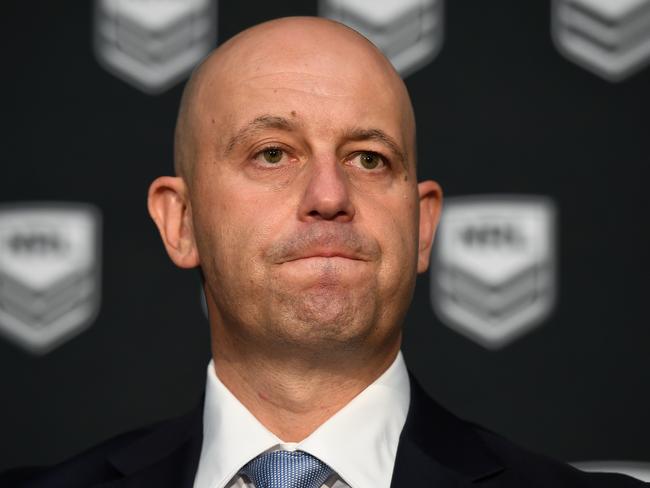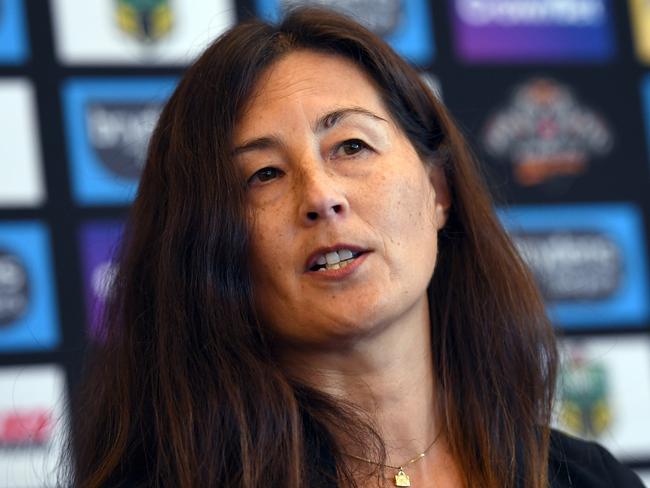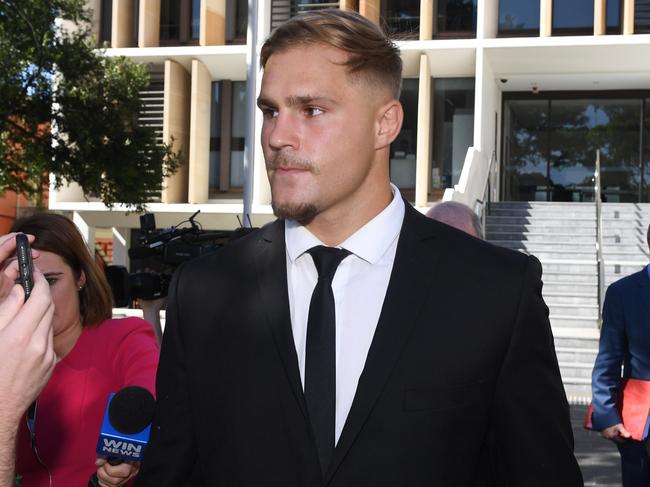How Megan Davis aims to change the NRL’s blokey culture
ARL commissioner, Professor Megan Davis was brought in to perform a review into NRL culture. She believes that culture starts from the top and said the NRL headquarters would be as closely scrutinised as the clubs, Jessica Halloran reveals.
Opinion
Don't miss out on the headlines from Opinion. Followed categories will be added to My News.
As ARL commissioner Professor Megan Davis spoke about her upcoming review into NRL culture at a packed press conference on Thursday, over to her side NRL boss Todd Greenberg could be seen to be nodding vigorously in agreement.
It was as Davis stated, that culture starts from the top and that NRL headquarters would be as closely scrutinised as the clubs that Greenberg gestured his approval for her review.
It is a review that could reveal some uncomfortable truths about the game when it comes to women.
As it stands the ARLC has two women, Davis and Amanda Laing.

Greenberg’s NRL executive has just two women on it. In club land there are more cheerleaders than female board members, chairwomen and officials.
Then there is the ugly fact that five players have been charged with acts of violence against females since the end of last season.
Appointing Davis is a brave and clever move by the NRL.
The Queenslander comes to the game not only as an ardent fan (she supports the Cowboys) but with a stunning resume as one of the most respected constitutional lawyers and leaders in this country when it comes to social change.
Davis told this column that this week’s passing of the NRL’s new behavioural policy, which will see players stood down on serious criminal offences, and Greenberg to use his discretion to sideline those who face charges of crimes against women and children, as “a watershed moment”.
“This policy is a culture shift,” Davis said.
MORE FROM JESSICA HALLORAN:
NRL, PLAYERS’ UNION MUST CHANGE CULTURE OF VIOLENCE
NRL NEEDS TO GET RID OF VIOLENT MEN IN LEAGUE
Davis will embark on a forensic review in to NRL culture and the way the code treats and relates to women. She will speak to both men and women at clubs, players, past players, coaches, referees and many community and commercial partners — and assess the code’s attitude to women.
“By embarking on this review, the NRL are showing leadership and being progressive. They are holding a mirror up to itself and this is a gutsy and unflinching approach to take,” Davis said.
“They are not shrinking here. They are resolute, stepping up to the plate, in front of all of its fans and sponsors, the nation and they are saying; ‘we are going to make a change and we are not going to pretend it is easy, it’s not easy to change culture but we are going to have a go at it’.
“That is not hiding.”
Davis was the first Aboriginal Australian elected to a United Nations body and served as Australia’s representative on the UN Permanent Forum on Indigenous Peoples and now on the UN Human Rights Council expert body.
She said while the game’s willingness to embark on the review is “monumental”, change is always difficult.
“Much of the work that I have done with the United Nations over two decades, in human rights, is culture change; how do you shift social behaviour and norms whether it is in the indigenous area or whatever area you are in, this is a tough job,” Davis said.

“We know that we don’t fare well in this area [women] and to be open to change and to be open to this review is not insignificant — this is how culture shifts.
“With my UN hat on, culture is very difficult to change, no matter in what context, whether it be a UN bureaucracy or the attitude of many countries and cultures globally to women generally.
“What we do know is that the primary and proven way to change culture is through education but before the education can be effective, we need to understand in a nuanced and textured way, what the problem is.
"This is in my view, what the NRL is willing to do. This is not just leadership within the sporting world but national leadership. This is the competition saying we want to find a way to ensure that women and girls flourish in our sport. That’s how important women are to our game.”
One of the most senior women in the NRL, Wests Tigers chair Marina Go, says Davis’ work is incredibly important to overhauling the game’s culture.
“I welcome the ARLC appointment of Megan Davis to head this review, as a person of high integrity, and someone who has experience with these matters. She is a scholar of domestic violence. I feel like the review is in the best possible hands,” Go said.

Women are increasingly valuable to the code — last year’s successful launch of NRLW, there has been a 29 per cent jump in female participation in the sport and the women’s State of Origin (which out-rated the Wallabies) which attracted a TV audience of over a million.
“This week we heard women’s rugby league was the number rating female sport on TV,” Davis said.
“We know we have huge numbers of girls coming through and playing the game. It is a privilege that these girls and young women want to play our marvellous game.
“We want to maximise the opportunity that we have here to ensure that our policy culture, our decision-making culture, our leadership culture is inculcated with an ethic that respects and recognises women for the strength, breadth of skills, knowledge and contributions they bring to this extraordinary game of rugby league that has such an incredible impact on people’s lives.”
Davis — who is also the University of NSW’s Pro-Vice-Chancellor, and among other work drove the constitutional reform work that led to the Uluru Statement which proposed a First Nations advisory body to parliament (ALP and Shorten have committed to a referendum on the proposal in its first term, if elected) — is determined for the game to be a better place for women.

As the author of the UN’s first report into violence against Indigenous women and girls, the final point Davis makes is that the evidence is incontrovertible: violence against women stems from gender inequality.
“And there are many ways in which gender inequality manifests in any community,” Davis said.
“It sits on a spectrum. On one end is serious violence against women and on the other end it can be a gender pay gap, discriminatory behaviour in the workplace or general negative and derogatory attitudes to women. When we talk about culture — we are talking about reviewing that entire spectrum.
“What we want to do is make the game, the clubs, the headquarters a better place for women. Women should have serious career pathways at clubs and at NRL headquarters for example. They should have a solid pathways at club level, as match officials, as coaches.
“The game needs to provide more opportunities for women in positions that hold power and influence like Marina Go as chair of West’s Tigers or Lynne Anderson at Bulldogs or Rebecca Frizelle at the Titans.”
Davis is optimistic.
Culture can change.
“Rugby league is no stranger to leading the nation on major social issues. Rugby league was emancipatory for so many Aboriginal people in this country.
“We led the nation on rugby league fields across QLD and NSW when it came to Aboriginal players playing rugby league during the frontier era and protection era including my own family.
“There’s no reason why we can’t lead the nation again now on women, violence, gender inequality and sport.”
